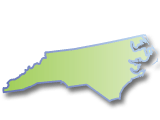North Carolina Rebates and Incentives Summary
 North Carolina is a leader in utility-sized solar farms and corporate sponsors like Apple building renewable energy sources of energy to power their data centers.
North Carolina is a leader in utility-sized solar farms and corporate sponsors like Apple building renewable energy sources of energy to power their data centers.
The dramatic investment in renewable energy is spurred, in part, by federal and state tax credits for installing renewable energy systems, selling clean energy back to the grid, and an open auction system through the buying and selling of Solar Renewable Energy Certificates known as SRECs.
Solar investment isn't limited to Apple. Other businesses and homeowners are doing it as well.
The main factor that has led to the growing renewable industry in the “Tar Heel State” is that it has adopted a Renewable Energy and Energy Efficiency Portfolio Standard (REPS) in 2008. This set of rules and regulations that dictate renewable standards statewide has paved the way for all investor-owned utilities in the state to supply 12.5 percent of retail electricity sales from eligible renewable energy resources by 2021. Moreover, municipal utilities and electric cooperatives must meet a target of 10 percent renewables by 2018.
To break it down by technology, North Carolina’s goal for solar-supplied energy to the state is 0.2 percent, and 0.2 percent energy recovery from swine waste by 2018, while the state has set forth to collect 900,000 megawatt-hours (MWh) of electricity derived from poultry waste by 2014. If all of this is actually achieved, the state of North Carolina will be producing a renewable energy total of at least 12.5 percent by 2021, but hopefully by that time we will be watching NASCAR events at the North Carolina Speedway under the glow of its very own 100 percent green-powered lighting system.
